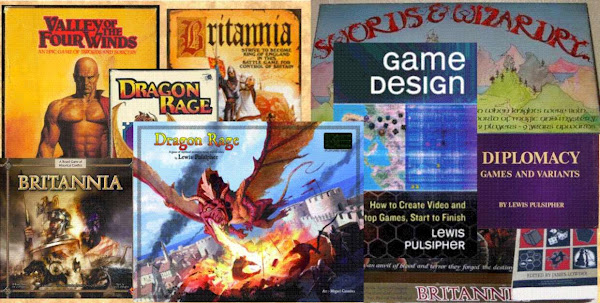Wednesday, January 17, 2018
Triptych 11
Three subjects in one blog post
• Where did we start out with in games?
• "Why should designers avoid these two extremely popular mechanisms?
• Catch-up Mechanisms - Why?
Where did we start out with in games? I suspect games started with players using their physical bodies, for example, in wrestling or running. Wrestling is the ultimate direct conflict between two sides. Running is the ultimate parallel competition, if you're running in separate lanes, because you can't do anything to hinder or help the opposition.
The first games, then, were likely "athleticware", depending primarily on athletic prowess and skill.
Games of chance probably preceded board games. Even where dice are unknown you can have a game of chance, as long as you can find objects that are two-sided that can be flipped or thrown. For example, you can throw a bunch of sea shells or throw a bunch of stones, you can even split a stick lengthwise and then throw a group of sticks to see whether they come up flat side or round side. We know from some games that use these methods that the ancients were poor at probability in relation to these two-sided questions. At some point someone invented a boardgame, if only to put holes in the ground for some form of mancala. Card games (and tile games beginning with dominoes) came vastly later.
So the ancient Greek Olympics involved everything ranging from direct competition to entirely parallel competition, but it was all using one's body. In that respect. These are athleticware, as opposed to thoughtware/brainware which occurs when you play a board game where good thinking is your path to success.
With video games, we’ve veered back toward athleticware (especially in AAA, not so much in casual).
**
Comment on a forum "Why should designers avoid these two extremely popular mechanisms? (Worker placement and deck-building)"
Why would I use a mechanism simply because it's popular? Especially a mechanism I dislike personally? I adapt mechanisms to the situation the game represents, or I devise my own mechanisms. That is, I might design several games using the same base system that I've devised, but I don't go out of my way to use a mechanism devised by someone else (though I have nothing against that, I just don't intend to do it). Long ago I did adopt other systems (Stratego, though quite modified). Not these days.
Now, there are SO many worker placement games, and SO many deck-building games, why would I want to make yet another one?
Many years ago (when it was still new) I did consider adapting deck-building to a Zombie apocalypse-style game, but it didn't work for me.
**
Comment on a forum: "But a board game should not be too punishing either. I despise board games where you just can't catch up when someone has an early lead, and where you already know far before the end that you will lose."
"Should" is a slippery word, different people have different opinions. Nor does every game need to be the same. So "punishing" mistakes is more appropriate in some games, less in others.
It's more often puzzles/parallel competitions where you can't catch up, than opposed games. Because in the former you have no strong way to affect the other players.
Nonetheless, there will be times when one player will play much better than others (or be much luckier): should that player be punished by having to put up with (from their point of view) bogus catch-up mechanisms?
Lew Pulsipher
Subscribe to:
Posts (Atom)










